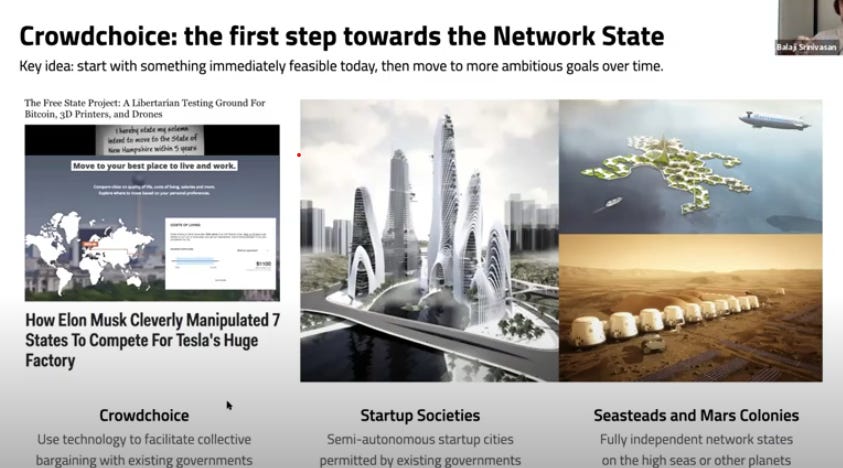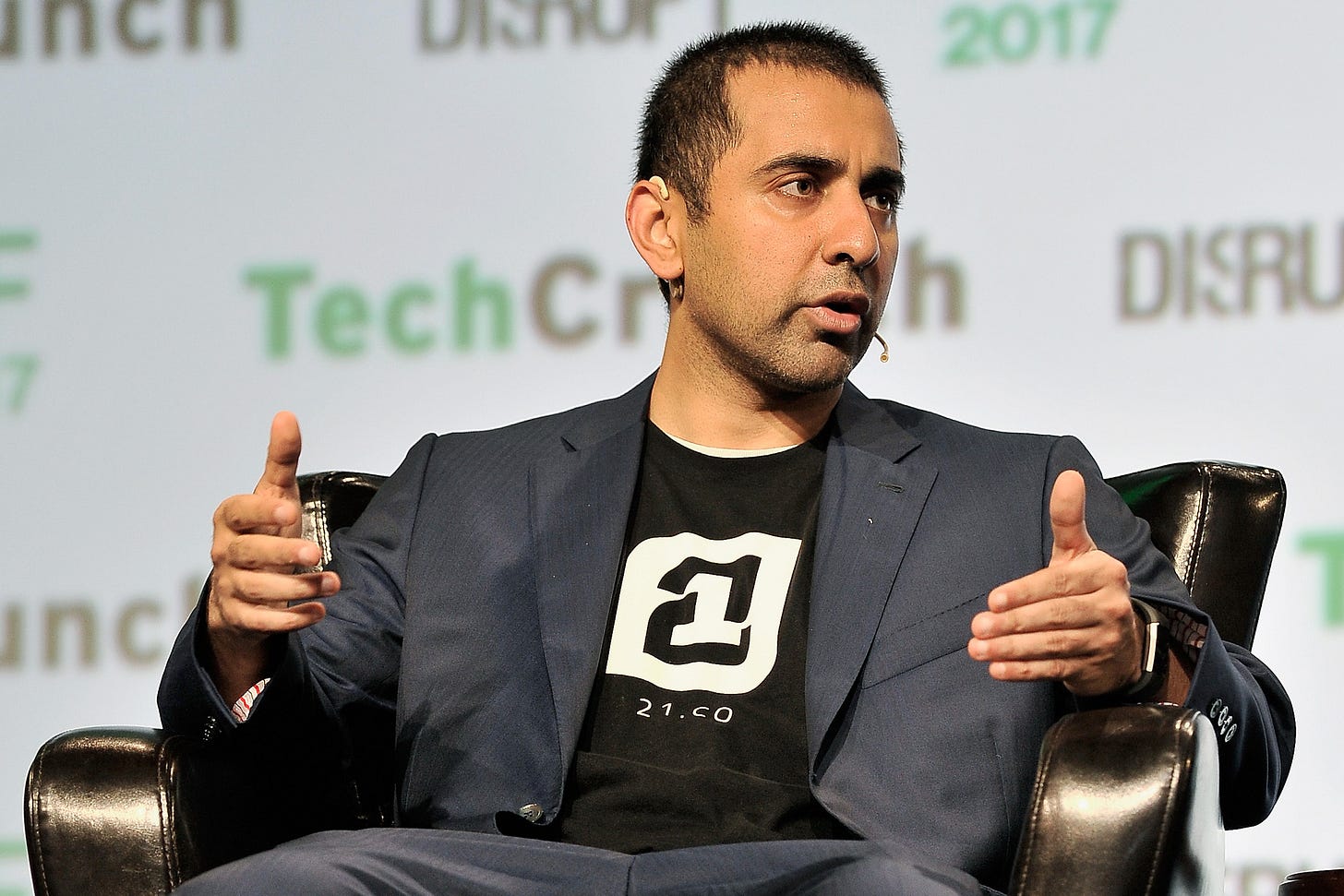"Capitalism was punishable by death" | Balaji Srinivasan talks Crypto, Decentralization, and Wokeness
Everything you missed.
It’s Balaji’s world, we’re all just living in it.
The angel investor and formerly CTO of Coinbase and General Partner at Andreesen Horowitz sat down with us last week for one of our best episodes to date. In this two-part series, Balaji riffs on topics ranging from the dynamics of city-building, the revolution of a decentralized creator economy, crypto capital, dissecting ‘big-tech’, Deng’s China, network states, and much more. It’s a wild ride from start to finish - we’ve compiled some of the biggest takeaways from the two-hour epic.
Catch the full episode on The Quest YouTube channel here, or listen to Part 1 on your favorite podcast app. We’re dropping Part 2 @ 9AM PT, Tue 15/06, so stay tuned.
Get in touch with Balaji on Twitter or read his musings at balajis.com
Here are some of our favorite takeaways:
Silicon Valley’s Ultimate Exit
In 2013, Balaji predicted that tensions and an eventual backlash were brewing against Silicon Valley. Tech had become increasingly over-concentrated and was disrupting too many industries. The signs were there, but no-one caught it.
No-one except for Balaji.
The ‘Reverse Diaspora’
Between 2013 and 2019, we saw a tectonic shift in public perception about tech, spurred by the disruption of traditional media outlets. East coast and traditional institutions turned on Silicon Valley, a rapidly emerging cultural demographic of immigrants, engineers, and the technologically-inclined who formed America’s wave of ‘new money.’
The pilgrimage to SV had birthed the formation of a new people, a ‘reverse diaspora’, diametrically opposed to traditional institutions. The two cultures, distinct ideologically and demographically, were poised for a clash.
“The east coast has developed an ideology with which they've captured full control of the state. They're going to be using it to go after tech with anti-trust...today, there's an animus towards the sector, and so it is regulation as a function of animus. It's not going to be narrowly tailored. It’s not going to be well-thought out, it's simply going to be ‘okay, they're bad, therefore, let's attack them’.”
Good Dragon, Bad Dragon
Balaji foresaw two outcomes in the ensuing conflict.
The modal, but worse outcome - Google, Facebook, and Amazon become true wards of the state as surveillance machines.
“The dark scenario, that I think is actually the most likely is Google just becomes evil… It's very similar to Game of Thrones where you had the good dragon, and then it gets killed and then its eyes get reanimated bright blue and now it's the evil dragon. That's basically exactly how I think about the woke suffocation, the capture of Google, especially, but then more generally the Silicon Valley tech companies.”
The possible, and favorable outcome - Crypto-capital aligns individuals against surveillance states behind values of free speech, markets, privacy protection from search and seizure, non-discrimination, and transparent contracts with impartial enforcement via blockchain.

Wokeness and Crypto
So how do we evangelize crypto? We could treat it the same way woke culture was installed in our heads over the last decade. The software lies latent in our heads as hooks, downloaded in our most impressionable years at university institutions and activated by a broadcast of sufficient social volume and appeal. Wokeness is a centralized ideology, in which individuals become broadcasters for institutions.

“It would make moral arguments that people in their most impressionable years in their teens and early twenties just absorbed uncritically. And most people don't just absorb this uncritically, they never challenged them.”
This ‘decentralized’ ideology of crypto capital is therefore able to contend with wokeness on its own terms, or as Balaji colorfully puts it, “the predator to the alien.”
The benefits of a crypto reform are obvious. Public blockchains are massively multiclient databases, where every user is a root user.1
“Why is that important? If the back end of Twitter was open-state, you could just basically write new front ends to it. You could write data analysis scripts, you wouldn't need the Twitter API, Twitter couldn't de-platform you, which they did to a lot of people.”
Developers, investors, and influencers benefit the most. Everybody can capture more of the value they create - “Basically what crypto is, is digital property rights.”
Deng’s China parallels the decentralized creator economy
To illustrate this point about digital property rights, Balaji takes us through a crash course in China’s recent economic history. Deng Xiaoping jumpstarted the transformation of China in the latter half of the twentieth century into an economic superpower by embracing some Western capitalist policies, namely the idea of individual ownership of production.

“So the key thing was that, Deng realized that if you allow the farmer to take a cut of their grain, they would produce more…and that's the most obvious thing in the world. And so that led to this gigantic multi-trillion dollar Chinese economy.”
Let’s extrapolate this epiphany to a decentralized creator economy - allowing people to take ownership of their digital labor and following. A crypto reform unlocks the individual’s digital property rights, which are seizure-resistant, whether you choose to monetize, or move from one platform to another.
The introduction of digital property rights will lead to an unlock on the scale of the Chinese economy.
So how does this reform happen? Well, the good thing is it doesn't have to happen. Big tech will gradually gravitate towards crypto because it is the most rational and profitable thing they could do. It doesn’t have to undergo some significant internal revolution, external disruptors will force their hand. Microsoft’s $7.5 billion acquisition of GitHub in 2018 and embracing of open-source is a perfect example of this.2
“I mean, Twitter and Facebook, because they're still founder-run, I actually think they've embraced crypto. I think they're the ones that are the most bullish, of the big tech companies of this decade. Google might be the weakest of them in terms of really not looking at decentralization or anything like that… and might be in some ways the most vulnerable to this over time. For example, you could imagine certainly decentralized crypto email. I think that's going to become a bigger and bigger thing.”

The universal adoption of a crypto technology network ensures that posts are authenticated by a digital signature by public and private keys. A decentralized crypto email system, for example, is desirable because it is not only feasible, but emails sent without this digital signature will become inherently less trustworthy over time.
Building a decentralized city using crypto

Crowdchoice and the Network State
Crowdchoice is the concept of a sovereign collective - a group of people unified by collective ideology that is not restrained by geography. Selective voting is digital rather than physical. Beyond ballot voting, you can vote with your feet and your wallet. You can include social features so that people can vote as a group, or block voting. Geography matters less because now everyone can essentially vote on anything. With the use of technology, cloud communities can collectively bargain with existing governments, and crowdfund territory in the real world.

“In theory, you know, I'm not saying this is good, but you could have a plebiscite on literally every issue now because everybody's got a mobile phone. The time, cost and the distance constraints are less.”

‘The Network State’ is something we will eventually be capable of. Digital currency is part of a fundamental shift in human organization - from shared geography, to shared ideas. Traditional Nation States are organized primarily by geography, where belief is secondary. For Balaji’s ‘Network State’, the opposite is true; the shared belief is primary, and geography is secondary. “With the internet as main governance mechanism, even those physical communities could be increasingly decentralized.”3
With a leader that can represent the collective sovereign, this is how you can build a city:
The New Digital Frontier | Technology potentiates Ideology?
Crypto serves as an internationalist extension of the venture capital. Historically, one of the fundamental driving forces behind American capitalist ethos was an idea of the wild frontier to the west, waiting to be conquered by the daring adventurer4. The closure of the frontier in the late nineteenth century correlated with the rise of strikes, unions, and communism, which necessitated seizing existing institutions through revolution. Almost exactly a century later however, the commercial internet (1991) has birthed a new digital frontier.
“Now, one theory on all this, which is interesting… but our future is our past.”

But why was centralization necessary at some points, and decentralization more suitable at other times? Before mass media and modern telecommunications, institutions and organizations were decentralized simply because they were limited by the constraints of technology. There just wasn’t enough bandwidth. It may turn out that every ideology has always been around for all time, but reliant on technological feasibility to manifest itself. The ideologies that dominated the twentieth century were those favored by centralized technologies such as mass media and mass production.
“So that's a different view of the world because people often think ideas dominate and script people and so and so forth. But maybe every idea has always been out there. We've had, the concepts around democracy or libertarianism or whatever for millennia, but what shifts is the technological balance of power.”
Tldr: Crypto is pretty neat. The primitives that a crypto address can give a user are comparable to the primitives that mobile or the internet gave you.





